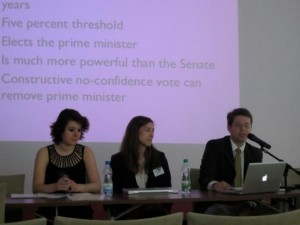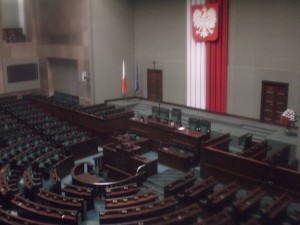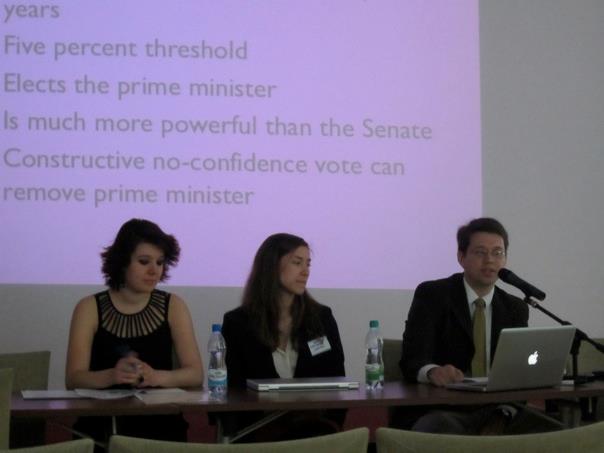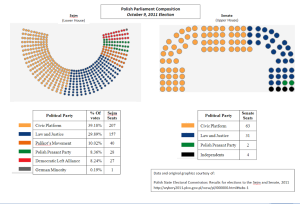I recently presented this paper at a Fulbright conference. Below is the final version that I used to make my presentation.
 |
| Me presenting this paper at a Fulbright conference. |
Introduction
Structural functionalism is an approach to studying comparative politics. It seeks to analyze both the actual structures of political institutions and the functions that these institutions carry out. While institutional structures vary from country to country, the same basic political functions occur in all states. Additionally, states with similar structures may still operate very differently because their institutions perform different functions. This paper will analyze the regime of the Republic of Poland using the structural functionalism model.[1]
Political Structures
The Republic of Poland is classified as a parliamentary republic.[2] Its constitutional structure is based at least in part on the German model.[3] It has a bicameral national legislature called the National Assembly. The lower house, the Sejm, has 460 members that are elected by party list proportional representation every four years. A party must gain at least five percent of the national vote to receive any seats.[4] Ethnic minority parties are an exception to the five percent rule.[5]
 |
| Sejm Chamber in Warsaw |
The upper house is called the Senate and has 100 members.[6] Senators are directly elected in single-member electoral districts every four years.[7] The Sejm can vote to dissolve the parliament with a two-thirds vote, which forces new elections for both houses.[8] The Sejm is much more powerful than the Senate. The Senate can veto legislation but the veto can be overturned by a simple majority vote in the Sejm.[9]
 |
| Senate Chamber in Warsaw |
Poland has a dual executive system with power shared between a prime minister and president. The prime minister serves as head of government, and the president serves as the head of state. The prime minister is selected by a vote in the Sejm, and then forms a government. The Sejm can remove the prime minister by a constructive no-confidence vote (as in Germany); this means that not only does a majority of the Sejm have to agree to remove a prime minister, but they have to also agree on a successor for the vote to be successful. Because of this, prime ministers are rarely removed by this method. The Sejm can also use no confidence votes to remove individual ministers from the government, even when it cannot muster the support to topple the government entirely. [10]
The president of Poland is directly elected by a national election and has meaningful powers. He can nominate the prime minister.[11] He can veto legislation, which can only be overturned by a three-fifths vote of the legislature. He can send legislation to the Constitutional Tribunal, the supreme court of Poland, and force a ruling on the legislation’s constitutionality.[12]He also has a strong role in foreign policy[13]and serves as the commander in chief of the armed forces and appoints many important officials.[14]The president can call new elections of parliament if it fails to pass a budget within four months of submitting a draft budget[15]or if the Sejm is unable to select a prime minister.[16]
Although the President does have meaningful powers, the prime minister is still the more powerful of the two offices because he is generally the head of the party controlling the Sejm. The prime minister’s role as head of government gives him greater influence in national politics.[17]
Political Parties
Poland has had an extremely unstable party system since the transition from communism. Many parties have come and gone: “The three parties that fared best in the September 2005 elections—Law and Justice, Civic Platform, and Self-Defense—had entered the Sejm for the first time only in 2001… [The] accompanying prime ministerial turnover is exceptional.”[18]Throughout Eastern Europe, incumbent parties have done poorly in most elections.[19]Additionally, because the electoral system of the Sejm uses proportional representation with medium-sized districts, one-party majorities are very difficult to achieve[20]and coalition government is the norm.
The most recent parliamentary election in Poland was held on October 9, 2011. The following charts show the election results and the current composition of the Polish legislature:
This latest election was an important turning point because it was the first time in Polish history since the fall of communism that a governing party won reelection. “In the first 18 years after communism, Poland had 13 different governments, a new one every 17 months on average.”[21]Civic Platform’s reelection is a sign of increasing political stability in Poland.[22]
Civic Platform is a center-right party, which has made enticing high-profile politicians to defect from other parties on both the left and right a foundation of its strategy. It has been largely successful in painting itself as a moderate, inclusive party,[23]which accounts for its recent electoral success. There is some danger, however, of an overreach that could break the party’s cohesion the broader the party becomes.[24] At present, the Civic Platform party controls the Sejm and therefore the government in coalition with the Polish Peasant Party,[25]a small left-wing party that represents rural interests.[26]Bronislaw Komorowski, the Polish President since 2010, is also a member of Civic Platform,[27]which gives the party solid control of executive power. Civic Platform has consistently been a pro-European integration party. In December, foreign minister Radosaw Sikorski of the ruling Civic Platform party showed commitment to the EU when he said that Poland planned to join the Eurozone by 2015 “despite its manifest problems.”[28]It is therefore not surprising that Civic Platform’s reelection was welcomed by other European leaders and observers.[29]
The largest opposition party in the Sejm at present is Law and Justice, a right wing party that is focused on law and order.[30]It is perceived by many as a “divisive and overly conservative force.”[31]It has followed a nationalistic and anti-EU policy, and has opposed the privatization of health care facilities put forth by Civic Platform.[32]This past November, Jarosław Kaczyński, the leader of the party and a former prime minister, voiced concerns that France and Germany are dominating all other members of the EU and that to join the euro would be suicidal for the Polish economy.[33]
On the left side of the opposition are two parties: Palikot’s Movement and the Democratic Left Alliance. Palikot’s Movement is a progressive left wing party. It took third place in the recent Polish parliamentary elections. Among their MPs admitted to parliament are a transsexual woman and an openly gay man, the first in Polish history. The party supports gay rights and abortion rights, opposes the influence of the Roman Catholic Church,[34]and seeks the legalization of both soft and hard drugs, including amphetamines, MDMA, heroin and LSD.[35]
The Democratic Left Alliance is a “direct successor to the Communist Party, which has recast itself as a social democratic movement.”[36]It has been in decline of late; it was a ruling party after winning 41 percent of the vote with a coalition partner in 2001[37]but received just over eight percent of the vote in the October elections.[38]
Recruitment of Elites
Polish society has a very strong and deep-seated aversion to political parties. Part of this comes from their history. Many Poles, especially from the older generation, associate political parties as a whole with the memory of brutal, one-party authoritarian rule under the communist People’s Republic of Poland. Others “accuse parties of failing to represent average people, of causing conflict and chaos within the country, of being primarily concerned with their own self-interest, and of being political cliques, striving for power.”[39]
This perception clearly affects the recruitment of ruling elites, a function common to all states. Public opinion forces Polish governments to focus very strongly on making the public image of their ministers “emphasize their education, their relevant experience (often heading a relevant parliamentary commission), and their professional successes.”[40]They also make a great effort to include women, younger politicians, and leaders from particular regions of Poland into their governing coalition. They try to make it appear that professional merit drives minister choices. Leszek Miller, prime minister from 2001-2004, “demonstrated his lack of constraint by party loyalties” by appointing Barbara Piwnik and Michal Kleiber to his cabinet, both well respected in their fields and non-partisan independents. The general rule however is that “the most important factor [driving appointments] is the candidate’s political position within his or her own party.”[41]
Economic Issues
Energy independence is an important concern for Poland. Russia is using its extensive natural resources, especially its supplies of natural gas, as leverage to increase its influence and power over its customer states in Europe. In January 2009, Moscow turned off the natural gas pipeline to the Ukraine, leaving people across Europe without heat in the middle of winter, and tripled their asking price for natural gas overnight. Ukraine believed it was a move to punish it for reaching out to NATO and the European Union.[42]Whatever Moscow’s motives, the experience was a reminder to countries like Poland of the value of seeking energy independence.
Poland has been seeking to develop shale gas resources to provide its own source of natural gas. If estimates pan out, by the end of this year, residents of Pomorskie voivodship will be able to cut their heat expenses by twenty percent by using locally produced shale gas instead of imported Russian natural gas; industrial-scale production is expected by 2014.[43] However, corruption is an issue; seven people were arrested in January in connection with alleged bribes related to licensing for shale gas exploration.[44] In addition, the viability of shale natural gas has not yet been proved:
“If shale gas can be exploited in a commercially viable way, then it is absolutely the best solution for Polish energy independence. Unfortunately, the commercial viability of shale gas is still very much an open question. Nobody knows yet how this will play out. If the projected shale gas reserves in Poland actually exist, and if those reserves can actually be exploited in a safe, economically-viable way, then shale gas will change Poland’s future. Those are really big ‘ifs’ at the moment.”[45]
In more general economic terms, Poland’s future looks promising. Poland’s GDP is projected to continue to grow by an annual average of 3.8 percent through 2015. Because it did not focus its economy on exports as much as Slovakia or the Czech Republic, it was hurt much less by the 2008 economic crisis that sparked such a large decline in global trade. Poland also was the only member of the European Union to maintain positive growth throughout the crisis.[46]
There are however, still some serious concerns. While maintaining an independent currency has been helpful in avoiding some of the fallout surrounding the euro crisis, the zloty went down in relation to the swiss franc by a full ten percent in 2011. This is not a small problem for Poland, because more than half of all Polish mortgages are denominated in the swiss franc, not the zloty.[47]
Unemployment is also a problem. Not everyone has been sharing in Poland’s economic growth; unemployment is at 12.1 percent nationwide, and in some regions it is as high as 21 percent.[48]Unemployment has also hit young people very hard; the unemployment rate for university graduates was near 20 percent in 2011. Economic realities are driving many young people to emigrate to find work elsewhere,[49]and Poland’s long term prospects for economic growth suffer as some of the best and brightest leave the country. The Organization for Economic Co-operation and Development recommended in 2009 that the Polish government specifically target young people with policies like reducing social security taxes on low-wage jobs and improving vocational education programs to address this issue.[50]
Foreign Policy Issues
Poland faces some of the same national security threats as the rest of the world, including terrorism. Many years of reconciliation with Germany combined with the European integration project has made it very unlikely that a military threat will come from Poland’s western border, but Poles do still fear the power of the Russian bear to the east. However, Poland simply cannot afford a modernized standing army big enough to defend against a Russian invasion by itself.[51]
It is no surprise then that Poland sought to join NATO and enjoy the Article 5 protections to try to guarantee its own security with the power of the United States and its allies. Nevertheless, Poles are skeptical of how much they can count on NATO guarantees. They had a similar alliance in 1938 that did not save them from the devastation of World War II; European countries as a whole have been slashing their defense budgets; and the US is planning to withdraw half its military forces stationed in Europe.[52]
It is likely that NATO Article 5 guarantees would not leave Poland alone against a full-out Russian invasion; such a naked act of aggression would be quickly condemned by the world community, and would not likely be in Russia’s interest. A much more likely threat is a limited Russian incursion, comparable in scope to its 2008 invasion of Georgia; perhaps an invasion to gain territory that would connect Russia’s bases in Kaliningrad to Russia through Belarus could be one such scenario. Under such circumstances, it would not be unimaginable to think that NATO would not bring into play a full Article 5 response and refuse to get involved, leaving Poland to defend the corridor alone.[53]While NATO is obligated to respond in the event of an “attack,” an “attack” is only an “attack” if the North Atlantic Council unanimously calls it such. The terminology that the council chooses to use is politically important; NATO diplomats refer to the 2008 invasion of Georgia not as an “attack” or “invasion,” but rather as a “disproportionate military response.”[54]
The best thing that Poland can do to defend against such a possibility is to focus developing its military structure against such a small regional incursion instead of against a full armored invasion of the entire country, by improving its air defenses and building new highly mobile armored infantry units that can quickly respond to a limited attack.[55]
Poland’s skepticism of NATO’s commitment to its security has led it to try to seek other parallel security arrangements to defend its interests. In May 2011 Poland committed to forming a joint battlegroup with Hungary, Slovakia, and the Czech Republic, and in July Poland committed to forming a joint military force with France and Germany. In addition, Poland is seeking to expand its bilateral military ties with the United States.[56]
Poland is also seeking to help other nations in the transition to democracy. Leaders from regimes affected by the Arab Spring movements have come to Poland to learn the lessons from Poland’s 1989 democratic transition. Poland is also a safe haven for democratic dissidents from Belarus. Staff from Egypt, Libya and Tunisia observed Poland’s recent October parliamentary elections to learn better ways of implementing electoral reform in their own countries. Poland is very well-equipped to serve as an example; it didn’t prop up Arab dictators and it doesn’t have the baggage of a colonialist past to impede its diplomatic efforts.[57]
Conclusion
Poland has a brutal history of subjugation by its neighbors that goes back for centuries. Now, only two decades after it finally cast off the yoke of communism and Soviet domination, it has a functioning parliamentary democracy with free and fair elections; has a thriving, modernizing economy; is a member of the European Union and NATO; has enjoyed economic growth while its neighbors sank into recession; and is serving as an example for democratic transition to the developing world. This demonstrates to the world the amazing resilience of the Polish people and shows they have hope for a better future.
References
[1] G. Bingham J. Powell Jr, Russell Dalton and Kaare Strom, Comparative Politics Today: A World View (Glenview, IL: Pearson, 2011), 38.
[2]Economist Intelligence Unit. “Poland.” Country Report. no. 6 (July 2011): 26. International Security & Counter Terrorism Reference Center, EBSCOhost (accessed February 7, 2012).
[3]Thomas A. Baylis, “Embattled executives: Prime ministerial weakness in East Central Europe,” Communist and Post-Communist Studies 40, no. 1 (March 2007): 89. doi:10.1016/j.postcomstud.2006.12.007.http://www.sciencedirect.com/science/article/pii/S0967067X06000584 (accessed February 7, 2012).
[4]“Sejm of the Republic of Poland,” http://www.sejm.gov.pl/english/sejm/pos.htm (accessed February 7, 2012).
[5]“Poland,” CIA World Factbook. https://www.cia.gov/library/publications/the-world-factbook/geos/pl.html (accessed February 7, 2012).
[6]Economist Intelligence Unit. “Poland.” 26.
[7]“About the Upper House,” Senate of the Republic of Poland, http://www.senat.gov.pl/en/about-the-upper-house/ (accessed February 7, 2012).
[8]“Constitution of the Republic of Poland,” Article 98, http://www.sejm.gov.pl/prawo/konst/angielski/kon1.htm (accessed February 7, 2012).
[9]“About the Upper House,” Senate of the Republic of Poland.
[10]Baylis, “Embattled executives,” 90-91.
[11] Jacek Raciborski, “Forming government elites in a new democracy: The case of Poland,” Communist and Post-Communist Studies 40, no. 1(March 2007):22, doi:10.1016/j.postcomstud.2006.12.002,
http://www.sciencedirect.com/science/article/pii/S0967067X06000535 (accessed February 7, 2012).
[12]“Constitution of the Republic of Poland,” Article 122.
[13]Baylis, “Embattled executives,” 90.
[14]“Constitution of the Republic of Poland,” Article 134.
[15]“Constitution of the Republic of Poland,” Article 225.
[16]“Constitution of the Republic of Poland,” Article 155.
[17]Interview with US diplomat serving in Poland, January 27, 2012.
[18]Baylis, “Embattled executives,”87.
[19]Baylis, “Embattled executives,” 92.
[20] Raciborski, “Forming government elites in a new democracy,” 22.
[21]Associated Press, “Donald Tusk set for unprecedented second term as Polish prime minister,” The Guardian, October 9, 2011, http://www.guardian.co.uk/world/2011/oct/10/donald-tusk-wins-poland-election (accessed February 7, 2012).
[22]Interview with US diplomat serving in Poland, January 27, 2012.
[23] Economist Intelligence Unit, “Poland,” 26.
[24]Economist Intelligence Unit, “Poland,” 4.
[25]Associated Press, “Donald Tusk set for unprecedented second term.”
[26]Economist Intelligence Unit, “Poland,” 26.
[27]“Bronislaw Komorowski wins Polish presidential election,” The Guardian, July 5, 2010, http://www.guardian.co.uk/world/2010/jul/05/bronislaw-komorowski-polish-presidential-election?INTCMP=ILCNETTXT3487 (accessed February 7, 2012).
[28]Helen Pidd, Angelique Chrisafis, & Henry McDonald. Debt crisis: public mood ranges from resigned to revolutionary. The Guardian, December 6, 2011, http://www. guardian.co.uk/business/2011/dec/06/debt-crisis-public-mood (accessed February 7, 2012).
[29]Ingham, David. 2011. PO win ‘good for EU relations.’ Warsaw Business Journal, October 10, 2011. http://www.wbj.pl/article-56417-po-win-good-for-eu-relations.html (accessed February 7, 2012).
[30]Economist Intelligence Unit, “Poland,” 26.
[31]Economist Intelligence Unit, “Poland,” 4-5.
[32]Economist Intelligence Unit, “Poland,” 16.
[33]Adekoya, Remi. 2011. Kaczyński: path to euro is ‘suicide’ for Poland. Warsaw Business Journal, November 9. http://www.wbj.pl/article-56862-kaczynski-path-to-euro-is-suicide-for-poland.html?typ=wbj (accessed February 7, 2012).
[34]Associated Press. Poland’s first transsexual and gay MPs take seats in parliament. The Guardian, November 8, 2011, http://www.guardian.co.uk/world/2011/nov/08/polish-transsexual-gay-mps-parliament (accessed February 7, 2012).
[35]Izabela Depczyk, “Palikot’s Movement wants to legalize possession of hard drugs.” Warsaw Business Journal, December 14, 2011, http://www.wbj.pl/article-57321-palikots-movement-wants-to-legalize-possession-of-hard-drugs.html?typ=ise (accessed February 7, 2012).
[36]Economist Intelligence Unit. “Poland,” 26.
[37]Raciborski, “Forming government elites in a new democracy,” 23.
[38] Polish State Electoral Commission. “Results for elections to the Sejm and Senate, 2011.”
[39]Raciborski, “Forming government elites in a new democracy,” 27-28.
[40]Raciborski, “Forming government elites in a new democracy,” 26-27.
[41]Raciborski, “Forming government elites in a new democracy,” 26-27.
[42]Bruce Crumley, “Russia’s Gazprom Diplomacy: Turning Off Europe’s Heat,” Time, January 7, 2009, http://www.time.com/time/world/article/0,8599,1870111,00.html (accessed February 7, 2011).
[43]Poland A.M., Shale gas to heat homes in Poland this year, Warsaw Business Journal, January 4, 2012. http://www.wbj.pl/article-57489-shale-gas-to-heat-homes-in-poland-this-year.html?typ=ise (accessed February 7, 2012).
[44]Poland A.M., “Corruption scandal hits Poland’s shale gas sector,” Warsaw Business Journal, January 11, 2012, http://www.wbj.pl/article-57574-corruption-scandal-hits-polands-shale-gas-sector.html?typ=wbj (accessed February 7, 2012).
[45]Interview with US diplomat serving in Poland, January 27, 2012.
[46]Economist Intelligence Unit, “Poland,” 8-9, 13.
[47]Economist Intelligence Unit, “Poland,” 10.
[48] Marsili, Annibale. “Has staying out of the Eurozone helped Turkey and Poland’s economies?” Seeking Alpha, January 10, 2012, http://seekingalpha.com/article/318702-has-staying-out-of-the-eurozone-helped-turkey-and-poland-s-economies (accessed February 7, 2012).
[49]Adam Leszczynski, “It’s a bad time to be young and Polish,” The Guardian, May 31, 2011, http://www.guardian.co.uk/commentisfree/2011/may/31/poland-youth-low-grade-work (accessed February 7, 2012).
[50]Organization for Economic Co-operation and Development, “Poland Should act quickly to improve job prospects for young people, says OECD,” November 23, 2009, http://www.oecd.org/document/33/0,3343,en_2649_37457_44115425_1_1_1_1,00.html (accessed February 7, 2012).
[51]Interview with US diplomat serving in Poland, January 27, 2012.
[52]Interview with US diplomat serving in Poland, January 27, 2012.
[53]Interview with US diplomat serving in Poland, January 27, 2012.
[54]Interview with NATO diplomat at NATO headquarters in Belgium, March 6, 2012.
[55]Interview with US diplomat serving in Poland, January 27, 2012.
[56]Strategic Forecasting, “Poland Looks for Security Alternatives,” July 14, 2011, retrieved from email subscription.
[57]Fairclough, Gordon. “Poland Gives Arab Nations Lessons.” Wall Street Journal, December 12, 2011. http://online.wsj.com/article/SB10001424052970204753404577066263327229298.html (accessed December 14, 2011).


Be the first to comment on "Regime Analysis of Poland (updated May 21, 2012)"